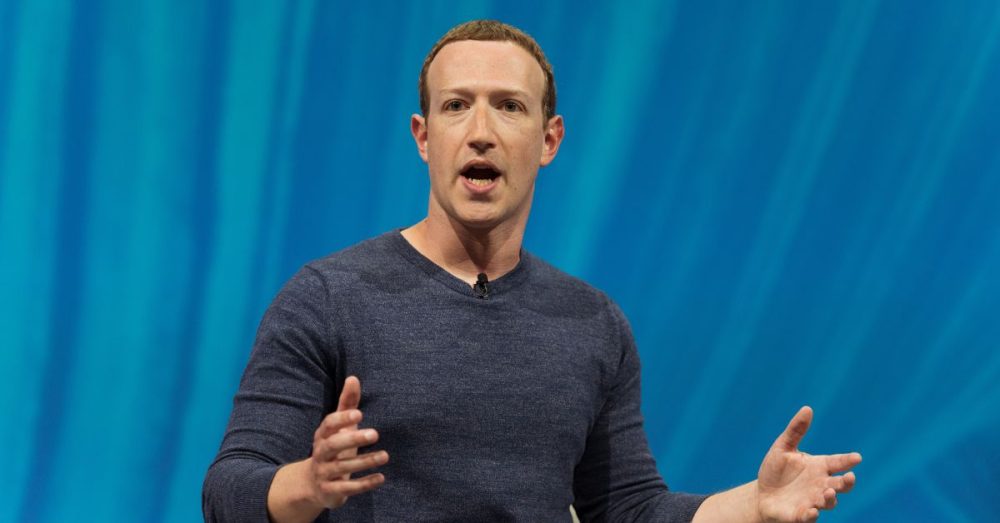Meta CEO Mark Zuckerberg admitted in a letter on Monday that Facebook, the company he founded, was pressured by the Biden Administration to censor American’s posts about COVID-19 content.
“There’s a lot of talk right now around how the U.S. government interacts with companies like Meta, and I want to be clear about our position,” Zuckerberg wrote. “Our platforms are for everyone – we’re about promoting speech and helping people connect in a safe and secure way. As part of this, we regularly hear from governments around the world and others with various concerns around public discourse and public safety.”
He told House Judiciary Committee Chairman Jim Jordan (R-Ohio) that in 2021, “senior officials” from the Biden administration and White House “repeatedly pressured our teams for months to censor certain COVID-19 content, including humor and satire.”
When Facebook did not immediately consent to the censorship, Zuckerberg said, the Biden administration imposed pressure.
“Ultimately, it was our decision whether or not to take content down, and we own our decisions, including COVID-19-related changes we made to our enforcement in the wake of this pressure,” Zuckerberg wrote. “I believe the government pressure was wrong, and I regret that we were not more outspoken about it.
However, pressure is likely an understatement. The Biden Administration openly threatened to support removing Facebook’s Section 230 protection if the social media giant did not crack down on COVID “misinformation.”
Section 230 says, “No provider or user of an interactive computer service shall be treated as the publisher or speaker of any information provided by another information content provider.” In layman’s terms, this means that Facebook is treated by the law as an Interactive computer service, not as a publisher. This means that Facebook can not be sued for user’s slander or libel on the platform.
If Section 230 protections had been removed, it could have opened the social media company to countless lawsuits and legal expenses.
Zuckerberg later added, “I also think we made some choices that, with the benefit of hindsight and new information, we wouldn’t make today. Like I said to our teams at the time, I feel strongly that we should not compromise our content standards to pressure from any Administration in either direction – and we’re ready to push back if something like this happens.”
The element that has driven the most shock from this letter is not that the censorship occurred but that Zuckerberg admitted it. Getting “Zucced” is slang that was popular amongst Gen Z Youth during the lead-up to the pandemic and the term became ubiquitous during the lockdown orders. The neologism is a shortened version of Zuckerberg’s name and most often referred to meme pages getting taken for making jokes that criticized COVID policy. Sometimes it is spelt as Zuced, zucked or Zucc’d.
The phenomena were observed on both Meta (Facebook and Instagram) and Twitter. Often, something would still be called “Zucced” even if it was not on Facebook because of the platform’s early embrace of censorship after the 2016 election. For example, during the pandemic, Angela McArdle lamented the lack of a word for this behavior on other platforms.
What's the Twitter equivalent of getting zucced? Getting jacked??
— Angela McArdle (@angela4LNCChair) November 27, 2021
She said in reference to Twitter’s founder Jack Dorsey, “What’s the Twitter equivalent of getting zucced? Getting jacked??”
Much of what Zuckerberg admitted became known during the lawsuits Murthy v Biden (originally Missouri v Biden) and Kennedy v Biden. Discovery in both these cases produced documents that revealed federal agencies, including the White House had been meeting with Facebook regularly to discuss ways to control misinformation, disinformation, and malinformation.
When Elon Musk purchased Twitter, he released internal documents from the platform that revealed the same thing had been going on there.
I recommend everyone leave examples of most recent censorship tactics encountered on @Meta in the comments of @JudiciaryGOP’s posts. I’m not buying that things have changed. https://t.co/HAecDq61Cl
— Mary Talley Bowden MD (@MdBreathe) August 27, 2024
Some of the people who had censorship were quick to speak out online. The famous COVID crusader and Houston ENT who successfully treated thousands of patients with Ivermectin and opposed vaccine mandates, Dr Mary Talley Bowden wrote on Twitter, “I recommend everyone leave examples of most recent censorship tactics encountered on @Meta in the comments of @JudiciaryGOP’s posts. I’m not buying that things have changed.”
Mark Z deserves no mercy. He had a choice. His choice changed the election and killed people. @JudiciaryGOP
— Mary Talley Bowden MD (@MdBreathe) August 27, 2024
“Mark Z deserves no mercy. He had a choice. His choice changed the election and killed people. @JudiciaryGOP,” she later Tweeted.
Looks like Mark Zuckerberg has joined the ranks of the crazed conspiracy theorists who claim that the Biden administration pressured Facebook to censor dissent during Covid.
— Robert F. Kennedy Jr (@RobertKennedyJr) August 27, 2024
“Looks like Mark Zuckerberg has joined the ranks of the crazed conspiracy theorists who claim that the Biden administration pressured Facebook to censor dissent during Covid,” Robert F Kennedy Jr quipped.
Bowden and Kennedy were among thousands of COVID dissidents who were either banned from social media platforms or had their posts throttled for criticizing COVID policy. In the case of RFK Jr, his Instagram was taken down at the behest of the White House less than 48 hours after Biden took office.
In the White House’s defense, a spokesman responded to Zuckerberg’s letter by telling Fox News, “When confronted with a deadly pandemic, this administration encouraged responsible actions to protect public health and safety. Our position has been clear and consistent: we believe tech companies and other private actors should take into account the effects their actions have on the American people, while making independent choices about the information they present.”


